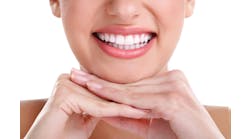Aged is a place we all come to: Treating elderly female dental patients with respect
By Eileen Morrissey
Author poses with her mother.
She comes to my office for her dental hygiene recare appointments, independently it seems. But actually she is not totally independent and relies on a caregiver for her transport. She's an elder, in the truest sense of the word, in her mid-80s or beyond. She could be your mother or grandmother, and, she is someone whom we will all become.
She appears somewhat frail, making her way to my treatment room with a cane. Slowly she sits herself down, shares a kind smile, and makes every effort to hear my questions and respond accordingly. My greatest challenge (and torment) is to have to treat her in the allocated time slot that we have set aside for all adult patients. (In my practice, there is no differentiation.) Yes, we realize it's our collective "bad" and plan to be more flexible in the months to come. This group deserves our time. But for now, it is what it is.
These female elders are patients in all of our practices. They are more common than in the past as people are living longer. Many still retain a significant percentage of their adult dentitions, which, of course, require professional maintenance. Elder women are frequently underserved. They may lack dental insurance and may be private-pay patients, often with meager funds to afford traditional private practice fees.
So, for this elder female patient, a representative of these queens of a generation, I will work hard to serve her well. For starters, she comes from an era that believes respect is recognized with the use of a title. To quote my own mother (also named Eileen Morrissey), age 90: "I don't need any young whippersnapper in a doctor's office calling me by my first name. I'm Mrs. Morrissey, if you please, and I thank you for referring to me in that manner." (Having learned this the hard way, I make certain to address people accordingly. My experience tells me that if someone prefers informality, they will let me know.)
We begin the appointment. How is her medical history? I stay mindful that all too often the mouth can tattle on the body, allowing manifestation of systemic diseases and syndromes. As I look inside, I need to be cognizant that she may exhibit the following oral changes-dryness of all interior and exterior tissues associated with decreased hormonal output, as well as medications. Tissues are generally thinning and bruise more easily. There is tremendous root caries potential. Periodontal disease and recession are often present. There are so many other possibilities. There's no autopilot permitted for me here. I must stay on high alert.
Systemically, I am aware that her general health may be ever changing. In a nutshell, her body parts are showing wear and tear. There is a decreased ability to hear and see. Cognitively, her reflexes have lessened and she is experiencing at least some memory loss, which is a given. Decreased mobility impedes her ability to move freely. There is a lessened dexterity and mental aptitude that may lead to confusion. We hygienists must be mindful of early to moderate dementia. It can be more challenging for this group to achieve optimum oral care despite use of the devices we recommended.
But it's more gut wrenching to me to see her loneliness. Many women in this demographic have lost their partners. They are striving to maintain independence, and in their visits to our practices, they are so hopeful for a listening ear and our patience as we work with them. We RDHs need to slow it down, always the challenge as the recare clock ticks away. I dedicate the second half of today's column to some of the special gestures I like to try to offer to my elder women patients.
I assist them in and out of the chair, help them on and off with their coats, purses and canes, hanging them as needed.
They appreciate the vitamin E capsules I give them to lubricate their dry lips. I keep pillows on hand for keeping their necks comfortable, and a blanket if someone becomes cold. My mother tells me she has never felt so warm and comfy as when covered with the lead apron! She wishes she could wear it through the appointment. We forget that their slowing metabolism can make older women perpetually chilly.
If someone has vertigo, as so many older women do, I stand while I treat and keep a patient upright if needed. "Don't put me back so far in the chair..." is one of their frequent requests. If this means continuing to use ultrasonics, I graciously oblige. Since I know that my Cavitron contributes to water overflow and fear of choking, I hand over control of the saliva ejector to the patients, and this helps. To that end, I use a cushioned one that will not bruise the floor of their mouth.
I am attentive to the potential sensitivity from the recession that afflicts so many older women. I often prepolish with a desensitizing paste, and I love the Colgate product. This preliminary step assists with initial debridement.
I write brief notes on a take-home sheet to reinforce the things I tell them that I feel are important. I don't expect them to retain the mega home-care instructions, so I keep it simple. No dissertations! The emphasis should be on regular professional care.
I write things like, "Please return to the office to see me in four to six months. Brush your teeth after every single meal, not just morning and night. If you have dentures, I need to check them because if they are slipping, you might avoid eating and not get enough nutrients. You might also aspirate your food and get pneumonia. You need to drink more water, all day, every day. Use your lip moisturizer and rinse your mouth frequently. Fluoride rinses and xylitol products will help with your dry mouth. Anything that is automatic such as an electric toothbrush, flosser, or Waterpik can also help a lot, if you're comfortable with these."
Feel free to include whatever else you can advise, my RDH colleagues. Whatever fits your patients is important.
Wise, wonderful, elder women (three especially come to mind), you are my role models! What I see in many of you is a trait I'm still struggling to call mine. You are grace personified, and I so admire this in you. I hope that all RDHs collectively pledge to keep our spirits bright as we journey through time. Onward we go; it is in our hearts' core. RDH
EILEEN MORRISSEY, RDH, MS, is a practicing clinician, speaker, and writer. She is an adjunct dental hygiene faculty member at Rowan College at Burlington County. Eileen offers CE forums to doctors, hygienists, and their teams. Reach her at [email protected] or 609-259-8008. Visit her website at www.eileenmorrissey.com.







